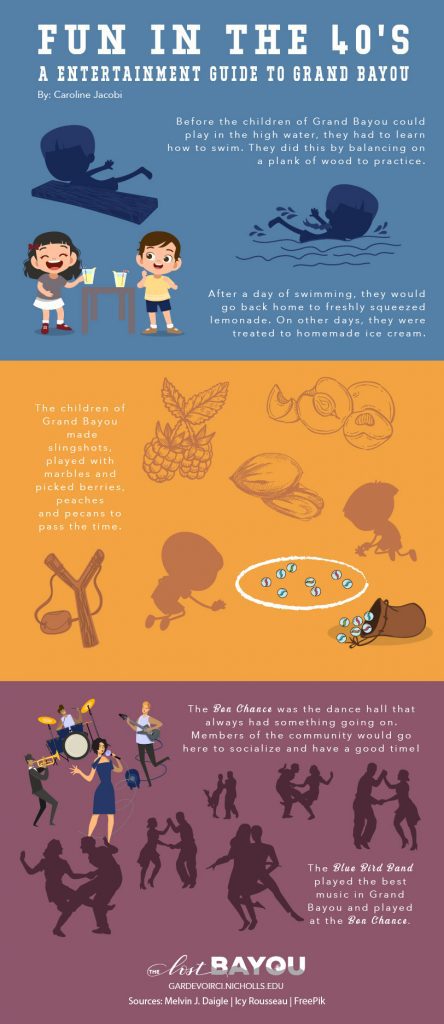By Shaun Breaux, Features Editor
When the people of Grand Bayou were not playing or swimming in the bayou, they would often have big neighborhood visits. While there wasn’t anything fancy to do in Grand Bayou, residents say they would find their own entertainment.
“Whether it was playing cards or other games or just watching other people do the stuff, we always laissez les bon temps rouler (let the good times roll),” says Grant Gautreaux, a Grand Bayou native.
At these popular house parties, people played games like Pedro, a sneaky card game, to Bourré, a trump or trick talking game.
“Nothing more friendlier than a pedro winner,” says Barry Schexnaydre, who visited family in Grand Bayou frequently.
While the rules varied from parish to parish, finding a South Louisiana native that doesn’t know how to play these games is the exception, says Schexnaydre.
Before house parties became the main source of entertainment in Grand Bayou, a fais do do was the place to be.
The name fais do do is referred to as a party where traditional Cajun dance is performed. The phrase literally means “to make sleep” and derives from the children going to bed before the party could begin. Street dances associated with festivals are also sometimes called fais-dodo in Cajun culture.
Jessica Rousseau Baye, Grand Bayou native, says that when they went out, they would go to Pierre Part or Donaldsonville.
“That was, you know, the places where they had bands and music,” Baye says. “We weren’t sheltered from that part, at that age.”
Although former Grand Bayou residents say they now find it hard to recall memories of when dance halls in Grand Bayou did exist.
The Bon Chance Club was introduced in the 1930s. Bon chance means “good luck” or “good courage,” making The Bon Chance Dance Club the center of entertainment in Grand Bayou at the time.
“That would have been way before my time, but yeah there was a little dance hall and they would have dances. My daddy, Howard Dupré Jr, used to play sometimes. He would have a guitar and a harmonica around his neck, play them both at the same time and then sing. I don’t know how he did it all at one time,” says Joey Dupré, Grand Bayou native.
Dance halls in Grand Bayou and throughout southern Louisiana flourished well after the early years.
A flyer from the Assumption Pioneer in 1976 says, “Deep in your heart, don’t you prefer dancing at the old Gear Room (150 years of dancing pleasure). Music by Herman Couple and his boys every Saturday 9 p.m. to 1 p.m. and Sunday 6 p.m. to 10 p.m. Free dance every Sunday except holidays and free supper at the Hulla Hoop every Tuesday.” The bottom of the flyer read, “Hwy 69, Grand Bayou.”

